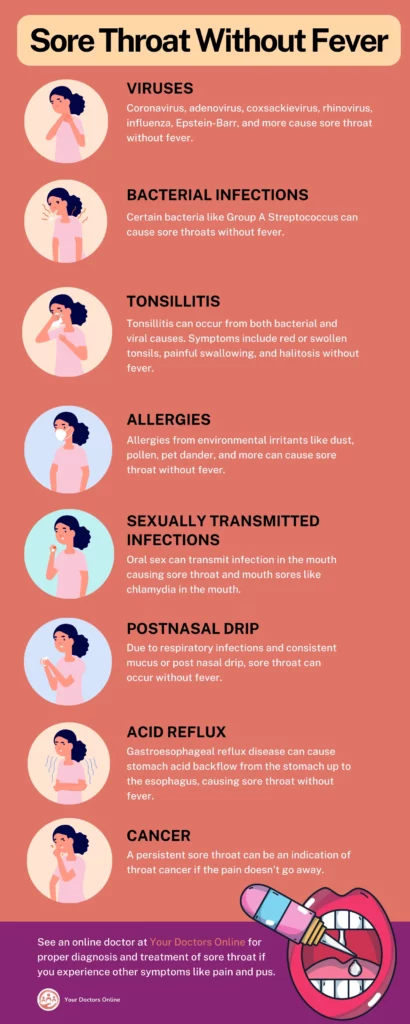You can have a sore throat without a fever in case of allergies or viral infections. A rare bacterial infection can sometimes cause a sore throat without fever. Your throat plays a crucial role in passing everything you eat, drink, and breathe. Thus, it can be challenging to ignore the discomfort when it becomes sore or inflamed. While it’s usually associated with a fever as a sign of infection, not all sore throats come with a rise in body temperature. Sore throats without fever can be equally discomforting and have a range of causes. Let’s explore the details of sore throats that occur without fever, exploring the potential causes, their symptoms, and how to manage them effectively.
Table of Contents
Toggle8 Causes of sore throat without fever
Sore throat, known as pharyngitis, is commonly caused by viruses or bacteria. It often accompanies symptoms like fever, cough, and a runny nose. However, there are instances when sore throat occurs independent of fever, which can be attributed to various factors.
Viruses
Viruses are the leading cause of sore throats and are responsible for many cases. The leading causes include coronavirus, adenovirus, coxsackievirus, rhinovirus, influenza, and Epstein-Barr, common viral strains that can lead to a sore throat called pharyngitis in approximately 50-80% of adults. These infections may also include additional symptoms like a stuffy nose and cough. Viruses also cause colds and are a widespread cause of sore throats, often accompanied by symptoms such as a stuffy nose. The primary focus in managing cold-related sore throats is symptom relief and comfort rather than a cure.
Treatment options
When treating viral causes of sore throat, rest and stay hydrated. You can also use over-the-counter pain relievers like acetaminophen or ibuprofen to treat any pain related to sore throat. Antiviral medications are not prescribed initially for the management of sore throat. Rest and hydration are preferred.
Bacterial infections
While bacterial infections are typically associated with fever, certain bacteria like Group A Streptococcus can cause sore throats without an elevated temperature. Antibiotics, alongside supportive care, are usually recommended for treating bacterial infections that cause sore throats. Additionally, bacteria like chlamydia pneumonia, mycoplasma pneumonia, Haemophilus influenzae, Neisseria meningitides, Neisseria gonorrhea, cyanobacterium haemolyticum, fusobacterium necrophorum, and corynebacterium diphtheria can also cause sore throat essentially without fever.
Treatment options
A doctor often prescribes antibiotics to treat bacterial infections. Supportive care includes rest, staying hydrated, and using pain relievers. Healthcare providers generally prescribe penicillin and amoxicillin to treat bacterial sore throats effectively.
Tonsillitis
Primarily affecting children, tonsillitis can emerge from both bacterial and viral causes. Symptoms may include red or swollen tonsils, painful swallowing, and halitosis. Bacterial tonsillitis may necessitate antibiotic treatment. The primary function of tonsillitis is to help clear wastes and infections from the body as a part of your lymphatic system.
Treatment options
For treating bacterial tonsilitis, antibiotics are usually prescribed per the severity of your medical condition. Amoxicillin and Penicillin are the commonly prescribed antibiotics for effectively treating bacterial tonsillitis. Getting a consultation for a timely diagnosis and a well-suited prescription is good.
Allergies
Airborne allergens, like pollen and dust, can trigger sore throats in individuals with allergies. Effectively managing allergies and their associated symptoms is pivotal in preventing recurrent sore throats. The most frequent allergic reaction symptoms include postnasal drip, sore throat, sneezing, cough, runny nose, watery eyes, and itching. Allergies cannot be cured but can be managed effectively using antihistamines and other allergy medications.
Treatment options
Anti-allergy medications like cetirizine are generally prescribed for treating sore throats due to allergies. Your healthcare provider can only determine the best anti-allergy medicines for you.
Sexually transmitted infections
Certain sexually transmitted infections can manifest with a sore throat as a symptom, predominantly transmitted through oral sex. Safe sexual practices are imperative in preventing these occurrences. It may not be the first symptom when having STIs. However, these infection-causing viruses and bacteria can colonize the mouth and show symptoms in a few days, especially in the case of oral sex.
Treatment options
For sexually transmitted infections like HIV, antiretroviral drugs are generally prescribed for treatment purposes. It is beneficial to always consult your healthcare provider for the effective treatment of your sexually transmitted disease.
Postnasal drip
Excess mucus draining into the back of the throat due to postnasal drip can lead to persistent sore throat. Symptoms may include sore throat, halitosis, and a perpetual need to clear the throat or swallow. Healthcare providers recommend saline nasal sprays and drips to treat excess mucus effectively.
Acid reflux
Gastroesophageal reflux disease (GERD) can irritate the throat when stomach acids regurgitate into the esophagus. Managing acid reflux often entails lifestyle adjustments and medications. If prolonged, this condition can irritate the stomach lining and cause permanent changes in the esophagus tissue.
Treatment options
Lifestyle adjustments, dietary changes, and medications prescribed by a doctor can help manage acid reflux in the stomach effectively. Omeprazole (Prilosec) and Ranitidine (Zantac) are the most prescribed medications for the effective treatment of acid reflux.
Cancers
While less common, throat cancer can present as a persistent sore throat affecting 31000 people in the United States. Additional symptoms encompass difficulties in swallowing, voice alterations, and nosebleeds. Risk factors include tobacco use, excessive alcohol consumption, HPV infection, and poor oral hygiene.
Treatment options
Some of the widely used and recommended treatment options for cancer include reducing risk factors, including avoiding tobacco and excessive alcohol consumption. Regular check-ups and early detection are essential for timely diagnosis and effective treatment.
How do you know if you have strep throat or a sore throat?
A sore throat will come with symptoms like a cold, with little to no fever. You will feel your mouth and throat getting dry and irritating the swallowing process, while strep throat due to an infection will come with a high fever ranging from 100 degrees or above. Extreme difficulty and painful swallowing with temperature increase are distinguishing signs and symptoms of strep throat.
Some of the ordinary yet distinguishing symptoms of sore throat are :
- Mild to moderate throat pain
- Scratchy or irritated feeling in the throat
- Difficulty swallowing
- Dry throat
- Hoarseness
- Mild cough
- Sneezing and runny nose
- No specific pattern of onset
While for strep throat, some of the common and distinguishing symptoms include:
- Severe throat pain
- Red and swollen tonsils, often with white patches or streaks of pus
- Painful or difficult swallowing
- Headache
- Stomachache
- High fever
- Red rash (scarlet fever) may accompany the infection
- Symptoms can appear suddenly and intensify rapidly.
Sore throat is also one of the symptoms of strep throat, where bacterial infections start, and your throat becomes extremely painful/sore, leading to difficulty swallowing.
How long does it typically take for a sore throat with a fever to go away?
While most viral sore throats resolve within 3 to 10 days, bacterial infections or allergies can prolong the duration of symptoms. The doctor may prescribe nonsteroidal anti-inflammatory drugs (NSAIDs), like naproxen, acetaminophen, and ibuprofen, to ease the symptoms. You need an antibiotic course for a bacterial infection like amoxicillin and penicillin, which sometimes spans around ten days or more.
Therefore, the duration may vary depending on the causal agent. In the case of acute pharyngitis, the recovery time is a few days. However, in the case of chronic conditions, it may take longer for complete recovery. In either case, medications can reduce the duration of the infection and improve symptoms like pain, scratchiness, and difficulty swallowing.
When to See a Healthcare Provider
If your sore throat endures or worsens, or you experience symptoms like fever, throat swelling, vomiting or coughing blood, difficulty breathing, weight loss, or severe pain, it’s essential to consult a healthcare provider. Moreover, symptoms such as throat swelling, breathing difficulties, or coughing up blood necessitate immediate medical attention. When in doubt, reaching out to a medical professional for a precise diagnosis and appropriate treatment is advisable.
FAQs about sore throat but no fever
If your sore throat exceeds five days and the symptoms don’t improve, consult your doctor for proper diagnosis and treatment. Moreover, if you are accompanied by other symptoms with a sore throat, like a fever of 101 degrees Celsius or higher, see a doctor immediately.
If your bedroom is dry, your throat can worsen at night. The best way to moisten the air you breathe is to keep a humidifier on at night to balance the humidity, which can also help ease the throat pain.








